NEW PHONE NUMBER 517-258-0038 | To care for UCC clergy and churches in Michigan.
NEW PHONE NUMBER 517-258-0038 | To care for UCC clergy and churches in Michigan.
Church News You Can Use
Jun 19, 2025

On this Juneteenth holiday, we remember that on June 19, 1865, enslaved people in Galveston, Texas, finally learned they were free, more than two years after the Emancipation Proclamation was issued by President Lincoln 30 months earlier. It is a reminder that justice moves too slowly and that this nation’s justice work on race is far from done. Last Fall, our staff and members of our board of directors entered into a six week program of study together, Animating Antiracism, which, speaking for myself, was also a reminder that my own work on race is far from done.
So I am grateful for the holiday of Juneteenth which gives me a chance to stop, reflect and be inspired by the stories of Black heroes from history, like the ones in this new UCC resource, Juneteenth: Celebrating Intergenerational Movement-Making toward Solidarity.
The theme ties in with our own new Michigan Conference Mitten Project in which we recognize how important it is to share the justice work of faith formation across the ages, and through the voices of people of all ages, because you never know who the Holy Spirit will speak through next!
Feb 21, 2025

Contentious times require more love. In my last pastoral letter to you, I talked about the ways in which the gospel rubs like sandpaper against the ways of the world. Today, I want to talk about the love that lies underneath that resistance.
Last week in the news, you may have seen that 27 religious groups are suing the Department of Homeland Security over the recent reversal of the “sensitive locations” policy, which previously restricted ICE immigration raids and arrests at houses of worship. I was personally disappointed that our national setting decided not to join the list of plaintiffs that included the Presbyterian Church (U.S.A.), Episcopalian and African Methodist Episcopal Zion denominations, but we can disagree and still love and care for each other, in covenant partnership where the conversation continues. Part of love is seeking to understand. I can only imagine how difficult that discernment decision, described here, must have been.
Love is Louder: Love Your Neighbor Out Loud is a UCC national initiative that I am genuinely excited about because it includes a practical toolkit for churches who want to widen their welcome to the transgender community, which finds itself under so many attacks these days. The beautiful Love is Louder language covers that and so much more.
There is the eternal and theological truth that God’s love is greater and more powerful than everything else, but there’s also the practical reality that If we want people to know that deep truth, we have to say it out loud. When was the last time you spoke out loud to someone outside the church about the power of God’s love? And when you speak to one another within the church, is love the loudest emotion a stranger walking by would hear?
I believe our churches are well placed to share the word to the world that love is louder than hate, but friends, we control the volume knob by both our voices and by our behavior. Take me for example, as your very human Conference Minister, whose role includes receiving the anxiety and criticism of the body when it is in pain. When I disagree or feel wounded myself, if my judgmentalism drowns out my love, I am just a noisy gong and a clanging cymbal. But when love is louder, the conversation continues, covenantally, even amidst disagreement. So I write this pastoral letter to myself as much as I write it to you. Contentious times call for greater love. Pump up the volume.
Peace and Blessings,
Lillian Daniel
Michigan Conference Minister
Jan 24, 2025
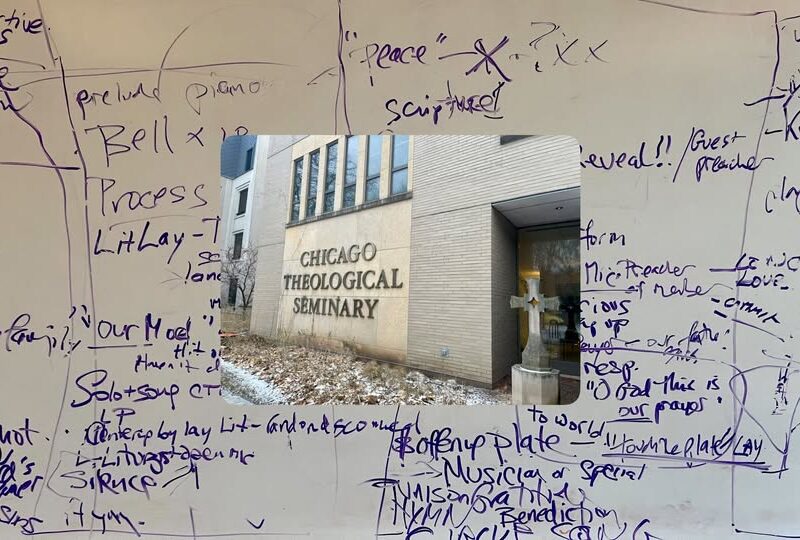
This has been an intense January and it is not over yet. From the shifting of political power in this inflamed nation, burning houses in California, freezing roads in Michigan, to the fears of God’s precious children who see their immigration status threatened, their genders mocked, their economic lives ignored. In the midst of it all, we still stop to remember the Christian witness of Martin Luther King Jr, his timeless words and also his sacrifice, in systems of evil where words were as easily weaponized back then as they are today.
At times like this I go deeper with God, resisting my own temptation to ask for a few new words with which to speak my own truth to the people who already agree with me. Instead I dare to ask what gift the Church has to bring, as imperfect as we are and as imperfect as we have always been.
Earlier in January, as the cruel California fires were burning, I was in freezing cold Chicago teaching a weeklong January intensive course on the History, Polity and Theology of the United Church Christ at Chicago Theological Seminary. Nowadays, almost all teaching at CTS happens online. Our class was the exception to the rule, meeting in person, in a classroom, all day for five days. For my enrolled students, whose street addresses ranged from East Coast Massachusetts to West Coast Washington, that week was their first time “on campus,” their first time inside the beautiful building that was imaginatively designed for a future hybrid learning world that was about to come sooner than the architects predicted when the 2011 cornerstone was laid, in a pandemic we didn’t see coming.
Nov 22, 2024

To any pastors or church members struggling to love each other in a politically diverse church, I want to tell you that this may be the most important ministry you ever do. God is still speaking and you never know who God will speak through next.
After the election, I hosted a reflection for our pastors and church members. There wasn’t much shock about the results—after all, we live in Michigan, where the country’s division is our local reality, embedded in our towns and within our churches. But there were a few pastors feeling surprised, scared, and rewriting their sermons for that Sunday.
My heart went out to them because they reminded me of myself, back in 2016, as a pastor who had recently moved to Dubuque, Iowa, from Illinois and was also truly shocked at those 2016 election results. Little did I know that, in the weeks that followed, I would discover my new Iowa congregation was much more politically diverse than I’d imagined. My carefully planned 2016 post-election sermon, as well as my long-scheduled, pastorally sensitive “drop-in” hours the day after the election, were all based on the idea that I would be comforting Republicans—not the other way around!
I had nothing to give at that post-election drop-in other than some soggy donuts (I’d probably been crying over them in the car) and the deeper struggle within myself: if I could have been so wrong about predicting the election results in Iowa and about understanding the deeply held views of my church members, was I equally wrong about my call from God to serve there? I think I basically told them all that in my sermon that week, which may have been way too much information for some church members who told me “We really didn’t want to hear who you voted for, Pastor!” There were a few lonely moments that winter of 2016 when I thought about packing my bags, but I’m so glad I didn’t. That purple congregation in the swing state of Iowa ended up being my sweetheart church. Pastors, you know what I’m talking about.
Eight years later, I’m now living in my second swing state and I am so grateful to be your Michigan Conference Minister, a pastor to pastors, responsible for the care of our congregations. I came here with my eyes open, thanks to a plain-spoken search committee who helped me to understand that despite a national news cycle full of unavoidable stories about Michigan militias and pandemic pandemonium, this complicated and diverse swing state is a very special place to be.
So after this recent election, I don’t feel shocked and therefore perhaps not as much pain or disappointment as others do in the United Church of Christ family. I am blessed to be here for such a time as this.
Sep 26, 2024
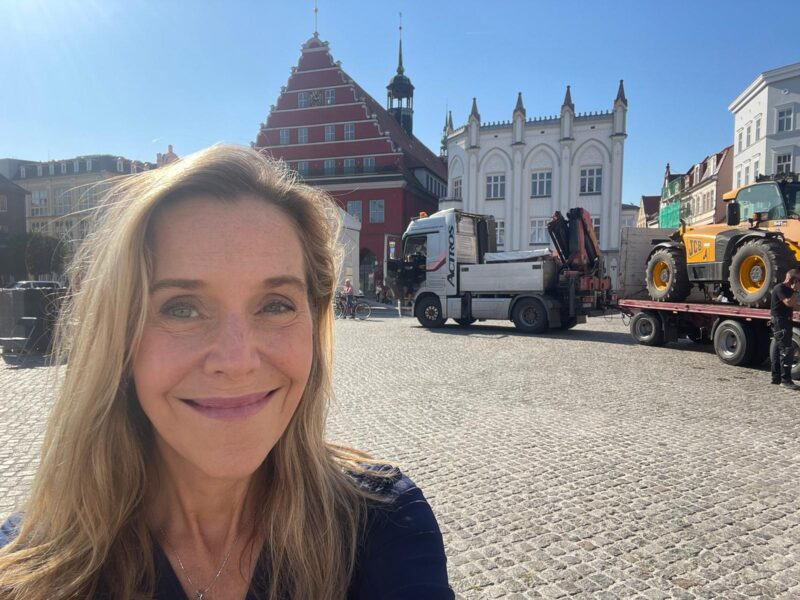
I am writing to you from a high speed train in Germany after visiting the Michigan Conference’s partner church in Northern Pomerania, because in my first year in this job, I promised someone I would do it. I remember hearing about how our Michigan church members poured decades into a partnership, with musical and youth exchanges, but like so many things in life, it had languished in recent years. They were tired but they didn’t want the program to die and by the end of our conversation, I didn’t either.
Besides, I also knew I could use the education. You see, in my thirty years of parish ministry, all four of the historic churches I have served were born of the Congregational tradition, which is only one of the five streams that make up our denomination (Congregational, Christian, Afro-Christian and the two German streams Evangelical and Reform.) So I know the stream that came from the pilgrims in England, but as I visit our UCC churches in Michigan, about half have their historic roots in Germany, with names like “Salem,” “Bethlehem,” and “Saint Paul’s,” started by farmers who may have first worshipped in a humble cabin. Their beautiful larger sanctuaries were built later by the next generation of woodworkers and bricklayers, extended families who came here to make a new life. Many of our churches held German language worship services until World War II made that untenable. The suspicion and prejudice they received as German immigrants, even those who had been here for generations, caused many to switch to English only, and to place an American flag in the sanctuary as a sign of their loyalty to the place that was now their homeland. These are the stories I have learned in my visits in Michigan, and they made me long to learn the story behind that story in the land in which it began.
Aug 23, 2024
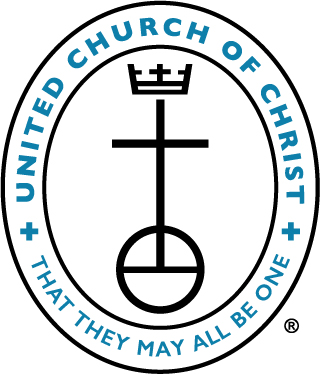
At the risk of stating the obvious, the United Church of Christ is a Christian denomination.
We have always been followers of the way of Jesus with a deep passion for bringing the Bible to the people, willing to stand up against the excesses of our own extended church family, but with humility because you never know who God will speak through next. Our ecumenical passion was bigger than the rest of Christianity’s. We are always reaching out to other Christians, including those who dismiss us. We are rebellious reformers, but also the first to call the warring factions together, trusting in the promise “that they may all be one.”
Ecumenically, we stand in the Reformed tradition that was not very traditional when it started. Some of our forebears were willing to be burnt at the stake so that people could read the Bible for themselves in their own language. The reformers didn’t do it to draw attention to an educational equity issue, or a justice issue, or even a class revolution, although all those things can spring forth when people try to follow Christ because the Holy Spirit is never asleep. But let’s be clear: the motivation of those early reformers, and to the current reformers who gather under the UCC tent to worship something other than themselves, was not to boost a political party, or to be first among ecclesiastical franchisees to produce the next spiritual happy meal, or even to create a list of “historic firsts” for a marketing campaign that I imagine our forebears would hate. They risked their lives and their relationships with the institutional church, not to create a new list of merit badges for secular forces to run through the church for some higher good. No, they did it all so that future generations could hear and read the gospel of Jesus Christ as they had. They were willing to bet it all on the idea that God was still speaking. And they didn’t make that up as a tagline, they found it in their worship and practice as Christians.
Jun 25, 2024

“Save the Environment!”
I saw the slogan everywhere growing up, on tee shirts and bumper stickers but it was the posters of exotic animals from far away that captured my childhood imagination. They were my first hint that the world was huge and I had only seen a small patch of it.
I lost myself in the posters of parrots in paradise, monkeys in the rainforest, polar bears staring at stars while lounging on glaciers, and of course the bamboo-nibbling panda couples on that special date night in the wilderness. All of them seemed to be beckoning me to jump on the hang glider of eco-justice and come rescue them. Later, I was somewhat disappointed to learn that none of these animals were looking for me to rescue them by bringing them home as pets. Apparently, these rare creatures wanted me to save them by saving their environment, and then by leaving them alone. As I matured, that mission of preserving some species’ habitat inspired me. But in the interests of honesty, I’d also like to briefly thank Jesus for inventing stuffed animals, which got me through a potentially rudderless time.
Today, I look back on all those early imprinting visuals featuring animals that I would never see in my own block or backyard, and I now believe that I subconsciously internalized the message that the environment was somewhere else, far away, in a special spot much prettier than my boring neighborhood or block, and therefore much more deserving of preserving.
But there comes a time to put aside childish things, including the idea that the environment we should be saving is somewhere else, out on an iceberg our grandchildren may never see unless we get our Alaskan cruise tickets early.
May 17, 2024

As you read this, I am returning from the second annual, four-day, Michigan Conference Clergy Preaching retreat at beautiful Tower Hill Camp on the dunes of Lake Michigan. For this event all clergy participants received generous scholarships to reduce the cost of the event, through a Brown grant but mostly by what your local churches give through the “Basic Support” designation of “Our Church’s Wider Mission.” (OCWM)
There are many ways to support the denomination within OCWM. Through special envelope offerings such as the Christmas Fund (which the Michigan Conference sends straight to the national Pension Board to help retired clergy in need) or One Great Hour of Sharing (that we send straight to the National Setting of the UCC for their ministry of disaster relief.) But it is your “Basic Support” gift within OCWM that stays most local and allows us to equip, encourage and connect the churches and clergy of the Michigan Conference, responding to real needs, right here and right now.
One way we do that is attending to the care of our clergy. This is the focus of Rev. Cheryl Burke, our Associate Conference Minister of Clergy Care and Formation. Under her leadership, in the last two months we have launched thirteen new caring clergy groups. Six of these groups are led by committed clergy volunteers, the rest are led by staff. No pastor should have to do this work alone, nor should our Committees on Ministry. This is why Cheryl is meeting with them all, to connect us in best practices and community.
The care of congregations is the focus for Rev. Lawrence Richardson, our Associate Conference Minister of Church Vitality and Transitions. He meets with governing boards about strategy, vision and revitalization. When churches are seeking a pastor, he helps recruit candidates and connect our search committees to the person that God has already called. This week, he co-led the preaching retreat with me. Where does that fall in his job description? Under the category of “We’re all part of a team and we help each other out.”
Apr 18, 2024
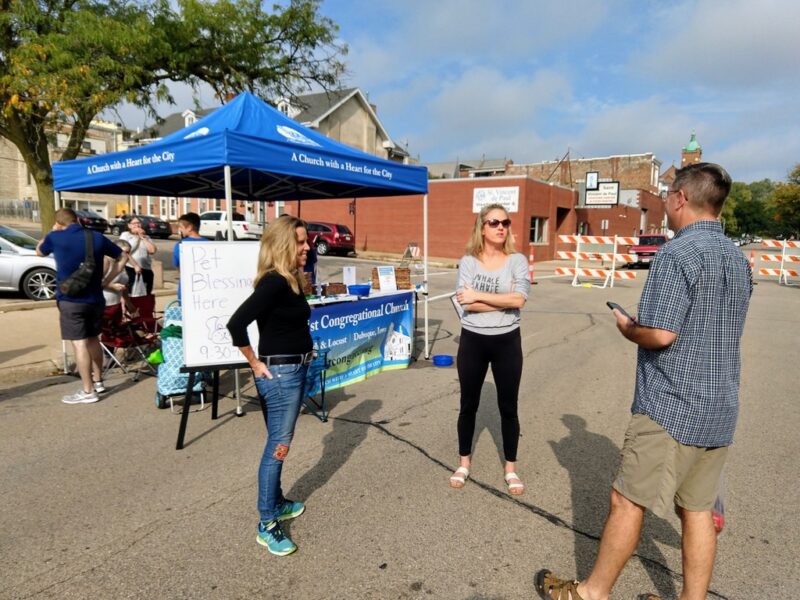
When our churches shut down in-person during the pandemic, we learned what we missed and what we did not miss. Speaking personally, I missed visiting the sick, comforting the grieving, praying in unison and singing. I missed eating food together and I even missed washing dishes. I missed funerals more than I missed committee meetings. It was clarifying. Today when I think of what the church should be about when we gather in person, I think of the things I missed the most when we couldn’t.
Another clarifying question from that time was who, in our surrounding communities, missed our churches when we shut down in person. This question is not for the pastor or the church member, but for the outsider who walks by the building. What loss did the community suffer in our absence?
If your church served a free meal once a week, that would be missed by people outside your church if it had to stop. If you host twelve step meetings, if you offer meeting space to teenagers, if you provide coats in the winter and fresh vegetables in the summer, all that would be missed by people outside church. But if community members missed nothing when your church closed down, that is also clarifying.
As I visit our Michigan churches, a different one most weekends, I look for commonalities among the congregations that feel vital to me. What is a vital church? It’s one where I feel the Spirit moving in the worship, where there is a sense of hope and hospitality, and a serious sense of service. A vital church is one you want to come back to. And when it comes to vitality, I am always reminded that size isn’t everything.
Mar 20, 2024
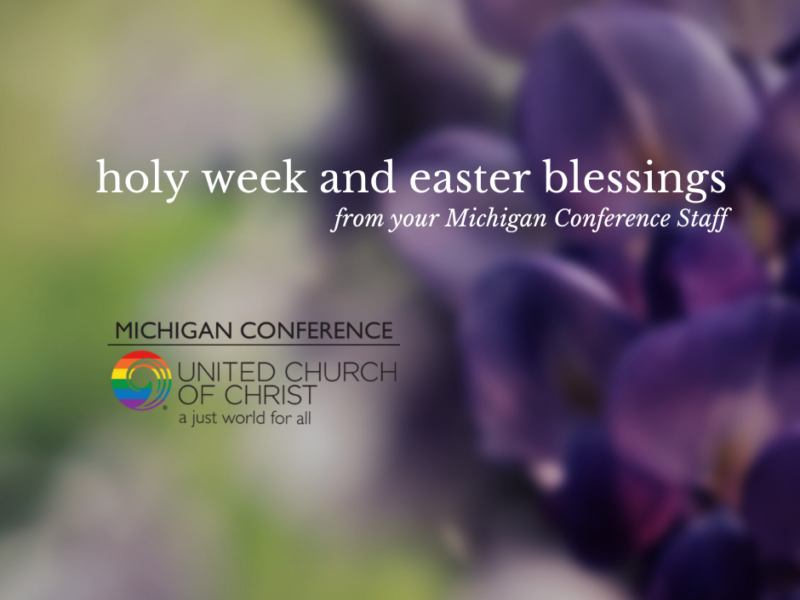
March Monthly Conference Minister Message from Lillian Daniel:
* Updates on Action related to the Michigan Conference Resolution of Witness in Support of Second Look Legislation March 19, 2024 at 8:00am
* Opportunity for pastors and members-in-discernment to sign up for Caring Clergy Communities
* Conference Communication submission deadlines, and more…
Sign up to receive our newsletter.